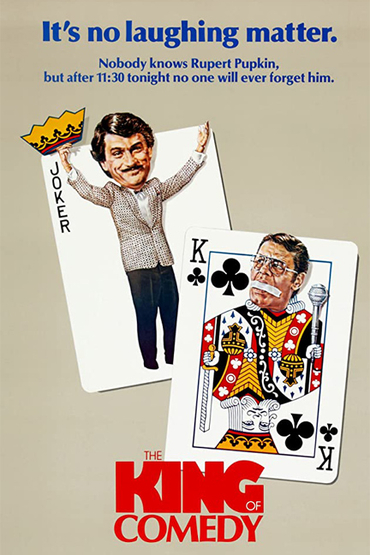 Mark is "on assignment", as CBS used to say about Dan Rather, for a few weeks. So, as we approach the first anniversary of Jerry Lewis's death, we thought we'd invite Mark's compatriot Kathy Shaidle to offer her take on one of Lewis's most famous roles:
Mark is "on assignment", as CBS used to say about Dan Rather, for a few weeks. So, as we approach the first anniversary of Jerry Lewis's death, we thought we'd invite Mark's compatriot Kathy Shaidle to offer her take on one of Lewis's most famous roles:
On the occasion of Jerry Lewis's death, Mark Steyn looked back at the comedian's "beautifully detailed performance of a very general idea of late 20th-century celebrity," playing late-night talk show host Jerry Langford in Martin Scorsese's The King of Comedy (1982):
As Langford's first fateful encounter with stalker and stand-up comic manqué Rupert Pupkin (Robert De Niro) fitfully winds down [at the end of the opening scenes above], Steyn recalls:
The limo pulls up smoothly to the Ziegfeldian stairway at the foot of Jerry's apartment building, and the star glides nimbly up the steps...
It seems like an odd moment to single out while recounting the movie's plot points. Obviously, other scenes are freighted with more calculated import: Pupkin playacting a "talk show" in his basement (complete with life sized cardboard "guests") while fending off his unseen mother's interruptions; Pupkin's fantasized "lunch" with Langford, followed by his all too real kidnapping of his hero, and that audacious ransom demand; the film's ambiguous finale: all are essential to Scorsese's pitiless sounding of the entertainment-celebrity complex and its discontents.
Yet those seemingly insignificant seconds — of a TV superstar trotting up towards the revolving glass doors of his high-rise home — always stuck with me, too.
Why?
According to KnowYourMeme.com, the word "cringeworthy," while coined in the early 1970s, only became a vernacular staple in our present century. That makes sense: for the longest time, the only widely accessible founts of visual "cringe" were "America's Funniest Home Videos" and certain species of daytime talk TV.
Today, however, the internet has broadened our exposure to images so vicariously embarrassing that we envy the turtle's retractable head: amateur performers of limited prowess and charm — much like Rupert Pupkin — aiming for instantaneous fame via YouTube, WorldStarHipHop and such. The King of Comedy, which bombed upon release, is now inevitably described as "ahead of its time" for good reason.
Everything about Pupkin — his eccentric appearance (that haircut, moustache and suiting seem only tenuously attached to De Niro's familiar person); his desperation and unearned sense of entitlement; and, of course, his corny sense of humor — is even worse than cringeworthy: it's cringe-inducing. Viewing the film during its first theatrical run, I couldn't stop contorting in my seat: wincing, covering my eyes and, I seem to remember, curling up in a ball.
When Lewis mounted those stairs, I experienced a few seconds' respite, felt as relieved as Langford probably did. That bumptious Pupkin was, at last, going away, however briefly.
Langford's gracefulness starkly contrasts with Pupkin's gaucherie. Jerry does indeed "glide nimbly" up that wide, unrailed flight, certainly more so than then-18-year-old me figured a 56-year-old man could manage.
And in a blink, Lewis convinced me that his character had lived in this building for decades, maybe even owned it; that — more imaginary backstory — Langford was a one-time song and dance man of some small repute; when that profession became extinct, alimony and rotten investments had steered him, circuitously, behind a talk show desk. To the surprise of many, not least himself, Langford turned out to be a natural in that most exclusive of American show-biz gigs. Then an institution, some even said a legend...
So the Jerry Langford who fairly skips up those steps seems, understandably, quite comfortable in his own skin. Yet — is it the way he crooks his arm? — a flicker of nervousness ripples beneath that "nimble glide." Has this Rupert Pupkin fellow unnerved him?
How could he not? The very existence of a Jerry Langford show aside, unless this film is set in an entirely alternative timeline, John Lennon had been murdered a few feet from his own Upper West Side front door, shot in the back by a "fan," less than two years earlier. When Langford turns his back on Pupkin for the last time that night, does he shiver, even slightly, anticipating a bullet?
Do we? This is the Scorsese of Taxi Driver, after all, and pre-Giuliani New York.
At first, I'd doubted Jerry Lewis had given any of this much thought before he heard the word, "Action!" Frankly, I've never much cared for the man, and didn't credit him with that degree of thoughtfulness. Lewis just went up those stairs the way he did in real life, I figured, propelled by fermented arrogance and paranoia, vintage 1973.
But an unusually perceptive Rolling Stone article about The King of Comedy published after Lewis' death revealed that the veteran entertainer had pushed himself beyond his comfort zone to prepare to play... himself. "I'm performing something I've never performed before in that intensity," Lewis said while promoting the film. "To see myself – because I had no mask or no disguise that I'm used to seeing this silly Jerry hide behind – it was doubly frightening because I was watching myself play a real-life moment in my life."
So if Langford falters for a split second on those steps, it may just be because Jerry Lewis is, like Duchamp's famous fractured figure in reverse, ascending the staircase naked.
~Kathy Shaidle is a pioneering Canadian blogger. If you're a Mark Steyn Club member, feel free to comment on Kathy's column below.






















